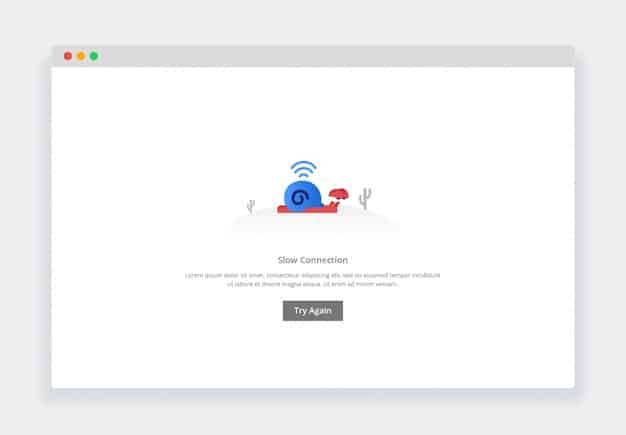Is Your VPN Leaking Data? Top 5 Security Flaws in 2025

In 2025, ensuring your VPN isn’t leaking data is critical; common flaws include IP leaks, DNS leaks, WebRTC leaks, protocol vulnerabilities, and outdated encryption, which can compromise your online privacy and security.
Is your VPN truly protecting your online activity, or is it secretly exposing your data? In 2025, staying vigilant about VPN security is more important than ever. Let’s delve into whether is your VPN leaking data? top 5 VPN security flaws to check in 2025.
Understanding VPN Data Leaks
VPNs are designed to create a secure, encrypted connection between your device and the internet, masking your IP address and protecting your data from prying eyes. However, VPNs are not foolproof, and various security flaws can lead to data leaks, compromising your privacy.
A data leak occurs when your real IP address, DNS requests, or other sensitive information is exposed despite using a VPN. This can happen due to misconfigurations, software vulnerabilities, or inherent limitations in VPN technology. Understanding these potential leaks is the first step in ensuring your VPN provides the protection you expect.
Why VPN Leaks Matter
VPN leaks can have serious consequences. If your real IP address is exposed, websites and online services can track your location and identify you. DNS leaks can reveal your browsing history to your internet service provider (ISP). WebRTC leaks can expose your IP address even when the VPN is active. Any of these leaks can undermine the purpose of using a VPN, leaving you vulnerable to surveillance, censorship, and other online threats.
- Compromised Anonymity: Leaks reveal your true IP address, defeating the purpose of masking your location.
- Data Exposure: DNS and WebRTC leaks expose your browsing history and other sensitive information.
- Security Risks: Vulnerable data makes you a target for cyberattacks and surveillance.
In short, VPN leaks negate many of the benefits of using a VPN, leaving you exposed to the same risks you were trying to avoid. It’s essential to regularly check your VPN for these flaws to ensure your online privacy remains intact.
To sum up, understanding what VPN data leaks are and the risks they pose is vital for maintaining your online security and anonymity. Regular monitoring and testing are crucial to ensure your VPN is functioning correctly and protecting your data as intended.
IP Address Leaks
One of the primary functions of a VPN is to mask your IP address, replacing it with one from the VPN server. However, if your VPN is leaking data, your real IP address might be exposed, defeating this purpose.
An IP address leak occurs when your actual IP address is visible to websites or services you access while connected to the VPN. This can happen due to various technical issues, such as misconfigured VPN settings or flaws in the VPN software.

How to Detect IP Address Leaks
Detecting IP address leaks is crucial to ensure your VPN is functioning correctly. Here are several methods to check for leaks:
- Use Online IP Leak Testing Tools: Several websites specialize in detecting IP address leaks. These tools check your IP address with and without the VPN enabled to see if there’s a discrepancy.
- Compare Your IP Address: Before connecting to your VPN, note your IP address. Then, connect to the VPN and check your IP address again using a website like whatsmyip.com. If the IP address matches your real one, there’s a leak.
- Check with Multiple Tools: Use multiple IP leak testing tools to confirm the results. Different tools may use different methods to detect leaks, providing a more comprehensive assessment.
Recognizing and addressing IP address leaks is a crucial step in maintaining your online anonymity and security when using a VPN. Regularly testing your VPN connection is part of due diligence.
In conclusion, IP address leaks represent a critical vulnerability in VPN security. By understanding how these leaks occur and using the methods outlined above to detect them, you can take proactive steps to protect your online privacy.
DNS Leaks
DNS leaks are another significant security flaw that can compromise your online privacy when using a VPN. Understanding what DNS leaks are and how to detect them is essential for ensuring your VPN provides adequate protection.
The Domain Name System (DNS) is like the internet’s phonebook, translating domain names (e.g., google.com) into IP addresses that computers can understand. When you use a VPN, your DNS requests should be routed through the VPN server to prevent your ISP from tracking your browsing activity. However, if a DNS leak occurs, your DNS requests are sent to your ISP’s DNS servers instead, revealing the websites you visit.
Why DNS Leaks Happen
Several factors can cause DNS leaks, including:
- Operating System Settings: Some operating systems may be configured to use specific DNS servers, bypassing the VPN’s DNS settings.
- VPN Software Configuration: Improperly configured VPN software may not correctly route DNS requests through the VPN server.
- IPv6 Connections: If your system uses IPv6, DNS requests may be sent outside the VPN tunnel if the VPN doesn’t fully support IPv6.
Testing for DNS Leaks
To test for DNS leaks, you can use online tools specifically designed for this purpose. These tools analyze your DNS requests to determine whether they are being routed through your VPN server or your ISP’s DNS servers.
- Use DNS Leak Test Websites: Several websites, such as dnsleaktest.com, can help you detect DNS leaks. These tools show which DNS servers are being used when you are connected to the VPN.
- Check Extended DNS Information: Run the extended test on a DNS leak test website to get more detailed information about your DNS settings and identify potential leaks.
- Verify DNS Server Location: Ensure the DNS servers being used are located in the same country as your VPN server. If they are located in your home country, it indicates a leak.
In summary, DNS leaks pose a significant threat to your online privacy by exposing your browsing history to your ISP. Regular testing and proper configuration of your VPN and operating system are essential to prevent these leaks and maintain your anonymity.
WebRTC Leaks
WebRTC (Web Real-Time Communication) is a technology that enables web browsers to support real-time communication, such as video and voice calls, without the need for plugins. While WebRTC offers convenient features, it can also expose your IP address, even when you are using a VPN.
WebRTC leaks occur because WebRTC uses STUN (Session Traversal Utilities for NAT) servers to discover your public IP address. This process can bypass the VPN tunnel, revealing your real IP address to websites that use WebRTC. Such leaks are a serious concern for VPN users who rely on their VPN to protect their anonymity.

How to Prevent WebRTC Leaks
Preventing WebRTC leaks requires specific measures to disable or block WebRTC functionality in your browser. Here are several methods to protect against WebRTC leaks:
- Disable WebRTC in Your Browser: The most effective way to prevent WebRTC leaks is to disable WebRTC in your browser settings. The method varies depending on the browser:
- Use Browser Extensions: Several browser extensions can block or manage WebRTC. Extensions like WebRTC Control or uBlock Origin can help prevent WebRTC leaks.
- Configure Browser Settings: Some browsers allow you to configure WebRTC settings directly. For example, you can disable WebRTC in Firefox by typing “about:config” in the address bar, searching for “media.peerconnection.enabled,” and setting it to “false.”
In conclusion, WebRTC leaks can compromise your anonymity by exposing your IP address, even when using a VPN. By understanding how WebRTC leaks occur and taking the necessary steps to disable or block WebRTC in your browser, you can protect your privacy and ensure your VPN provides the intended level of security.
VPN Protocol Vulnerabilities
VPN protocols are the backbone of secure VPN connections, dictating how data is encrypted and transmitted. However, not all protocols are created equal, and some have known vulnerabilities that could compromise your security.
A VPN protocol vulnerability refers to weaknesses in the design or implementation of a VPN protocol that can be exploited by attackers to intercept or decrypt VPN traffic. These vulnerabilities can lead to data leaks, man-in-the-middle attacks, or other security breaches.
Common VPN Protocols and Their Vulnerabilities
Understanding the strengths and weaknesses of different VPN protocols is critical for choosing the right one for your needs:
- PPTP (Point-to-Point Tunneling Protocol): PPTP is one of the oldest VPN protocols and is known to have significant security vulnerabilities. It uses weak encryption and is susceptible to interception. PPTP is generally not recommended for use.
- L2TP/IPsec (Layer 2 Tunneling Protocol/Internet Protocol Security): L2TP/IPsec is more secure than PPTP but can still be vulnerable if not configured properly. It can be susceptible to attacks if weak pre-shared keys are used.
- OpenVPN: OpenVPN is a highly secure and versatile protocol that supports strong encryption. It is open-source and widely used. However, its performance can be slower than other protocols.
- IKEv2/IPsec (Internet Key Exchange version 2/Internet Protocol Security): IKEv2/IPsec is a fast and secure protocol, particularly suitable for mobile devices. It provides automatic reconnection and is resistant to network changes.
- WireGuard: WireGuard is a modern VPN protocol known for its speed and security. It uses state-of-the-art encryption and has a streamlined codebase, making it easier to audit and maintain.
By knowing the security capabilities of various VPN protocols and selecting the appropriate protocol for your needs, you can improve your overall online security and protect your data from potential vulnerabilities.
In conclusion, VPN protocol vulnerabilities highlight the importance of choosing a VPN provider that uses secure and up-to-date protocols. Regularly evaluating your VPN’s security features and staying informed about emerging threats can help you maintain a robust defense against data leaks and other security breaches.
Outdated Encryption
Encryption is a cornerstone of VPN security, ensuring that your data is scrambled and unreadable to unauthorized parties. However, outdated or weak encryption methods can compromise the security of your VPN connection, leaving your data vulnerable to interception and decryption.
Outdated encryption refers to the use of encryption algorithms and protocols that are no longer considered secure due to advancements in technology and cryptanalysis. These older methods may have known vulnerabilities that can be exploited by attackers to break the encryption and access your data.
Why Upgrade Encryption?
As technology advances, so do the methods used by attackers to break encryption. Encryption algorithms that were once considered secure may become vulnerable over time due to increased computing power and new attack techniques. Upgrading to newer, stronger encryption methods is essential to stay ahead of these threats.
- Symmetric Ciphers: AES (Advanced Encryption Standard) with a key size of 128 bits or higher is widely recommended. Avoid older ciphers like DES or 3DES, which are considered weak.
- Asymmetric Encryption: RSA with a key size of at least 2048 bits or elliptic curve cryptography (ECC) is recommended for key exchange.
- Hash Functions: Use SHA-256 or SHA-3 for integrity checks to ensure that data has not been tampered with during transmission.
In short, ensure your VPN uses modern encryption standards such as AES-256, SHA-256, and strong key exchange protocols. Avoid VPNs that rely on older or weaker encryption methods.
- Regular Audits: Choose a VPN provider that conducts regular security audits to ensure their encryption and security practices are up to date.
- Strong Ciphersuites: Verify that the VPN uses strong ciphersuites that include modern encryption algorithms and protocols.
- Keep Software Updated: Ensure that your VPN software and operating system are always up to date to patch any security vulnerabilities.
To summarize, outdated encryption can significantly weaken your VPN security and expose your data to potential threats. By prioritizing VPN providers that use modern encryption standards and by staying informed about the latest security practices, you can ensure that your VPN provides a robust defense against interception and decryption.
| Key Point | Brief Description |
|---|---|
| 🛡️ IP Address Leaks | Your real IP address is exposed, revealing your location. Use online tools to check. |
| 🌐 DNS Leaks | DNS requests are sent to your ISP, exposing browsing history. Test with DNS leak test websites. |
| 📞 WebRTC Leaks | WebRTC can reveal your IP address. Disable WebRTC in your browser or use extensions. |
| 🔒 Outdated Encryption | Weak encryption methods can be exploited. Use VPNs with AES-256 or higher. |
FAQ
A VPN data leak occurs when your real IP address, DNS requests, or other sensitive information is exposed despite using a VPN. This undermines your online privacy.
Use online IP leak testing tools. Compare your IP address before and after connecting to the VPN. If they match, there is an IP leak.
WebRTC leaks expose your IP address through the WebRTC protocol. Prevent them by disabling WebRTC in your browser or using browser extensions.
Secure VPN protocols like OpenVPN and WireGuard ensure your data is encrypted and protected from interception. Avoid protocols like PPTP, which are known to be vulnerable.
Outdated encryption can be easily cracked, exposing your data. Always choose a VPN that uses modern encryption standards like AES-256 to ensure robust protection.
Conclusion
Staying informed about potential VPN security flaws is essential for protecting your online privacy in 2025. By regularly checking for IP address leaks, DNS leaks, WebRTC leaks, protocol vulnerabilities, and outdated encryption, you can ensure that your VPN provides the security it promises.





